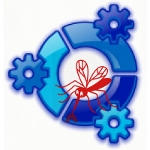Introduction:
- Richard says life has been good, lately, except for Linux Mint, but we'll get into that in a moment. Announcements and feedback are at the end of the show.
Topics:
- Linux Mint Sux!!! (At least, for Richard.)
- Richard's never-ending quest for a Linux distro that works for him. In the past few days, he's tried various Debian-based distributions:
- Linux Mint 12, with Gnome 3, MATE, and Cinnamon, but he didn't like any of them. Too few configuration options for the desktop and gtkpod didn't work, and that was a deal-breaker.
- Linux Mint Debian Edition (LMDE): one of the CPU cores wasn't running; fixed that, installed software and updates, but gtkpod didn't work there, either.
- Crunchbang Linux: too minimalist and too much configuration.
- XFCE on LMDE was close. Richard replaced the Thunar file manager with Nautilus.
- Xubuntu which is Ubuntu with XFCE. It looked good, was configurable, but lacked a few features.
- Kubuntu, which is Ubuntu with KDE. He tried installing it from the live CD, which took 25 minutes to complete. After the reboot, it generated all sorts of hard drive errors. While it's possible that the hard drive did fail, but Richard blames Kubuntu for causing the problem.
- Richard's never-ending quest for a Linux distro that works for him. In the past few days, he's tried various Debian-based distributions:
- Russ discusses OpenMediaVault, an open network attached storage solution.
- It's an alternative to FreeNAS.
- Debian-based with a simple install process, while FreeNAS is based on FreeBSD.
- Supports many features of FreeNAS, including CIFS/Samba, NFS, FTP, SSH, BitTorrent (via plugin), TFTP, and DAAP (via plugin).
- Russ tried it in a virtual machine, and it installed easily. Once installed, all configuration occurs through the web browser.
- While it's perhaps not as mature as FreeNAS, it's also a newer project, so it's likely to improve. At the moment, Russ prefers FreeNAS, especially v0.7, but OpenMediaVault may very well catch up and surpass FreeNAS.
- Linux Contesting Software revisited. We covered a few in Episode 70, and here are a couple more.
- Bill, W9YA, one of the maintainers of YFKtest, contacted Richard to inform him that YFKtest has had a major facelift, as well as adding a few features and fixing some bugs. It's available as v 0.0.10 from the subversion repository. Russ downloaded the compiled version. He picked a contest, filename for the log, entered his call sign, mode, and some other information, but he had trouble entering a contact.
- Minos Contest Logging Software is a contest logging suite for VHF and UHF Amateur Radio Contests. The current version is 1.5.4, and is available as a download or via the Subversion repository. It's a Windows application, and there are directions on the Web site for running the application using WINE. If only they'd simply re-release with Linux-native code. Russ tried it and it does run quite well under WINE. It's an open source project under the BSD license.
- Allstar Link Node Update: Russ now has an Allstar Link node number assigned, 28357. Allstar Link offers several packages: Limey Linux, ACID CentOS or Pickle Linux (for the BeagleBoard). Russ has been trying to get the ACiD version running on his LMDE machine so he can use it with his existing Asterisk installation. Meanwhile, Russ has his Echolink station working, node 54711.
Feedback:
- We received a voice comment from Ed, KB4VWA, who's having trouble with some MFJ TNCs he recently bought at the Dalton, GA hamfest. Richard responds, though he's had the least experience with MFJ TNCs. There are several possibilities: wrong on-air baud rate, bad connection, wrong dip switch settings, or poor or filtered audio into the TNC. Try using the jack on the back of the radio for the audio. Maybe the radio is not exactly on frequency?
Announcements:
- The OGG and MP3 feeds for the LHS Music and LHS Up All Night audio streams from the LHS web site have new links, so check your settings. The live streaming feed is mp3, so it works everywhere.
- The wAVEgUIDES podcast joins the Black Sparrow Media network! Visit blacksparrowmedia.net/join/ if you'd like to add your podcast to the Black Sparrow Media network.
- Episode renumbering: Ever since naming episodes 18a and 19a, it's been bugging Russ, so they were renumbered to eliminate the letter suffixes.
- LHS hopes to attend the 2012 Dayton Hamvention in May. Please donate to the cause to help make that happen!
Contact Info:
- Contact Richard at kb5jbv@gmail.com, Russ at k5tux@lhspodcast.info, or both at the same time at info@lhspodcast.info.
- Listen to the live stream every other Tuesday at 8:00pm Central time. Check the LHS web site for dates.
- Leave us a voice mail at 1-909-LHS-SHOW (1-909-547-7469), or record an introduction to the podcast.
- Sign up for the LHS mailing list.
- Sign up for the MAGNetcon mailing list.
- LHS merchandise is available at the Merch link on Web site. Check out the Badgerwear or buy one of the other LHS-branded items at PrintFection.com/lhs or Cafe Press. Thanks!
- Thanks to Dave from Gamma Leonis for the theme music.
Music:
- "Requiem For A Fish" by The Freak Fandango Orchestra from their album Tales Of A Dead Fish, courtesy of Jamendo.
- "Boats (Swept Away)" by I Am Not Left Handed, from their album Time To Leave, courtesy of Jamendo.

